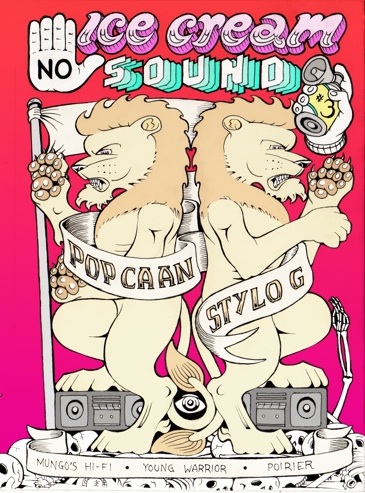As part of the post-hack clean up, I found a few drafts of things I’ve not been able to finish – here is the first… comment welcome!
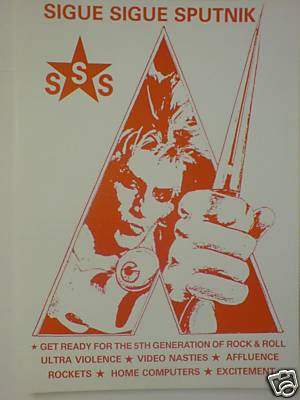
Some musings on Sigue Sigue Sputnik and their hyper-glamorised capitalism.
A wilfully optimistic reading of Mclaren’s “Rock N Roll Swindle” was that punk aimed to make “cash from chaos” as a fall back position. If you fail to destroy society, you may as well be rich.
“a group has to represent what’s exciting around in the world today”
– Tony James, South of Watford TV documentary on Sigue Sigue Sputnik, 1986
Sigue Sigue Sputnik revelled in products, affluence and multinational corporations like Sony and EMI. Not because these things signified wealth and success, but because they were exciting in and of themselves. Tony James (the band’s defacto ideas man) had previously been a punk alongside Billy Idol in Generation X. Punk’s DIY “get off your arse” ethos translates well in to the business world – every “self made millionaire” has exactly the same attitude.
But before we get to Sputnik and their 80s “sado capitalism”, what are the precedents for bohemians adopting the aesthetics of commerce?
As Stewart Home has noted, the mail art movement had parodied and imitated bureaucracy from the early 70s onwards:
“Most of those participating used the new ‘hot medium’ of xerox alongside old fashioned rubber stamps. Certificates were produced in great number, which, like the rubber stamps, were used to parody officialdom.” (The Assault On Culture, Chapter 13)
Mail art was influenced by Fluxus. Genesis P-Orridge participated in both these movements and would continue to imitate and parody the structures and signs of corporate bureaucracy with Industrial Records, Throbbing Gristle’s “Annual Reports” and Psychic TV as band/TV Station/cult.

At the end of the seventies Margaret Thatcher became Prime Minister and Johnny Rotten became John Lydon, director of Public Image Limited: “We’re a communications company, not a group”.
The transformation happened immediately after Rotten has spent three weeks in Jamaica with hip capitalist Richard Branson, scouting out talent for Virgin’s “Frontline” reggae sub-label: “Virgin offered me a job. It was the perfect break for me after the Sex Pistols split up.”
Early interviews with the band include reference to six Company Directors, including their accountant and Jeanette Lee (a non-musician who helped with mixing down tracks, video and interviews – Lee is now co-director of Rough Trade).
PiL’s business focus was a result of their frustrations with the music industry (being dictated to, being tied up in legal hassles) and a lack of autonomy. Adopting the guise of a businessman is punk’s DIY translated from the artistic to the economic. Like punk, it demystifies the role of “the artist” – as a special category for people with divine inspiration. But it also assumes that the corporate model is the correct/best one…
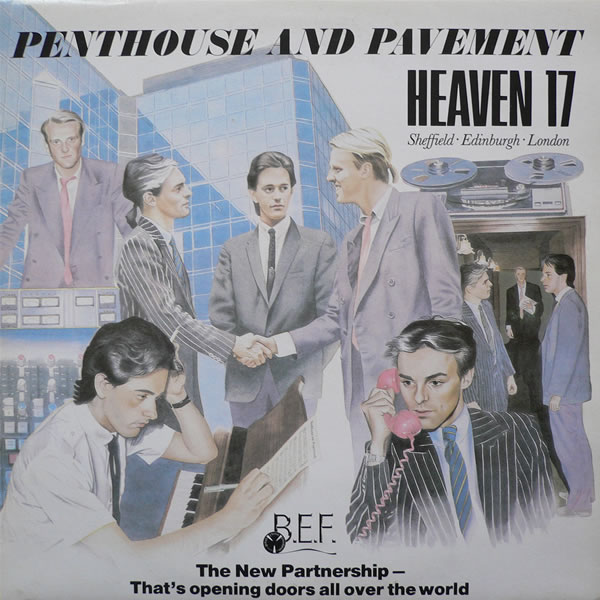
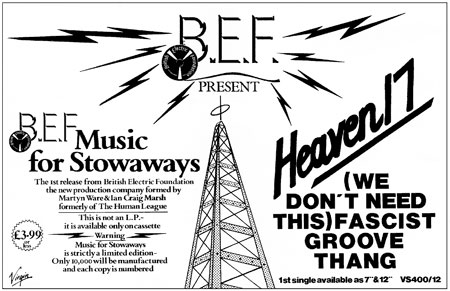
The PiL Corporation was followed by Heaven 17 and their “British Electric Foundation”
“The BEF are not just a group, they are a registered company with Marsh, Ware and Bob Last as the three shareholders – a business enterprise that is truly enterprising, and the essential tightness of The BEF is based around its organisation.
Ware: “What we’re doing is a much more realistic way of approaching things, you have just got to get out of the old cliched way of organising groups. I think that there are going to be more organisations like this in the future, with more of a business ambience about them.
I don’t think PiL have succeeded at all, they’re still just a group. Let’s face it, Public Image Limited are a moderately successful group. I can’t see any evidence of them being a business organisation at all.
I think that people may find it interesting, in as much as it’s an entirely different way of organising ones’ abilities and creative talents. It’s just getting away from the standard format of how groups are organised.”
And:
So you’re trying to create an almost Tamla-like stable of artists?
Ware: “Yes, because obviously it gives you more flexibility, and it also enables you to close down an enterprise that is not paying off. Not just financially, but also artistically.”
From an interview in Sounds, 11 April 1981 online here.
Ware, in the thrall of the business model calls for cutting of red tape, downsizing, flexibility. Heaven 17’s modus operandi here is very similar to the gradual breaking up of large workplaces in the into smaller units (with the consequent reduction in the influence of collective bargaining for workers). Or at least it would be if they had ended up being in any way distinguishable from any other group. As time passed there seemed to be less and less mention of BEF and more focussing on the core business of the Heaven 17 brand.
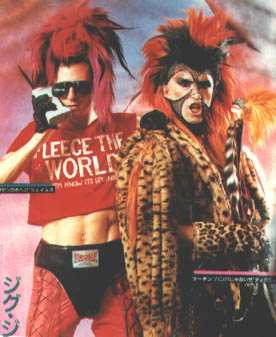
Sigue Sigue Sputnik might be the first band to admit that their branding was more important than the music. Indeed, Tony James never allowed record executives to hear SSS demo tracks, instead playing them a short video collage of futuristic and science-fiction movie clips.
The group signed to EMI, reportedly for 4 million quid. This arrangement was celebrated and presumably exagerated – in stark contrast to anarcho punks like Conflict who identified Thorn EMI’s links with arms trading and gave EMI groups like New Model Army a hard time:
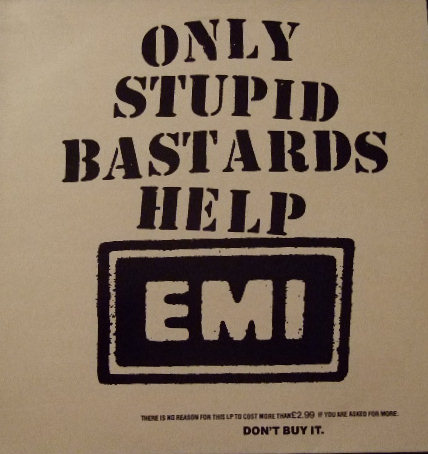
Conflict’s ascetic vegan anti-capitalism is the polar opposite of Sputnik’s total embrace of hi tech corporate culture. The video for “21st Century Boy” includes a shot of Martin Degville licking a Sony Discman. Sigue Sigue Sputnik embraced commercial sponsorship at a time when this was still thought of as massively uncool by most “serious” music fans.
They also provided the press with enough ammunition for either pro (slogans, excitement, good quotes, video) or anti (they can’t play, they are immoral, it glorifies sex and violence) coverage. According to James they were accompanied on a UK tour by tabloid journalist Garry Bushell who proposed that they entered News International’s Wapping compound on top of a tank as a publicity stunt during the lengthy picket by sacked printworkers. James et al didn’t do it (and haven’t said why) but Sam Fox did.
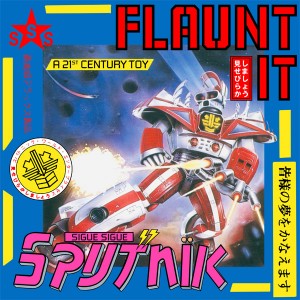
Ultra futurism dates quickly, but alongside the brick like mobile phones, corporate logos (Sony/EMI/Atari), anime, video nasties, et al – the group scored some bonafide “crystal ball” moments:
“Flaunt It”, the debut album, included adverts between the tracks for products like hair gel, youth culture magazines, the never-to-appear Sputnik video game, pirate TV station Network 21 and of course The Sputnik Corporation itself. This prefigures “free listening” services like Spotify which squeeze in ads between tracks.
Less plausibly Tony James also claims that their “Live TV” multimedia gig at The Royal Albert Hall influenced U2’s “Zooropa” tour. And the timestretching and pitch bending of the beats on “Love Missile F1-11” has resonances with Jungle…
More notes:
- The old eighties schism: Commodities, branding, adverts, contracts, suits VS inspiration, art, subversion, decadence, the triumph of the talented genius, culture.
- P Diddy / Abba / Pink Floyd / Lady Gaga all very successful brands, possibly because they are not “arch” about it. The brand is the music, the design, the concept of the band members as genius artists. Not grubby boardroom wheeler and dealers.
- Vs Cottage industries – Martin Degville’s limited edition art prints, deluxe vinyl represses down “the long tail”. Both The Pixies and Florence and The Machine have released very expensive, hand signed and lavishly produced editions of their work.
- Is exposing the inner workings of the music business still subversive in 2012? “It’s an [advertising] campaign, it has nothing to do with art.” to misquote Genesis P-Orridge on Heathen Earth.
- Is all this simply boardroom fetishism – bohemian individualists getting excited about the slim lines of the company logo, expense accounts, power? Rubber suits, office porn. Tony James holding up an umbrella, the bowler hats from Clockwork Orange reinstated as the icons of London commuters of yesteryear.
- The lie that this is glamorous (long hours, savage battles, insecurity, rules and regulations, budgets – work sucks!). The bohemian myth replaced with the American dream, that you can pull yourself up your own bootstraps and enter the terrain of the ruling class, by talent and tenacity alone.
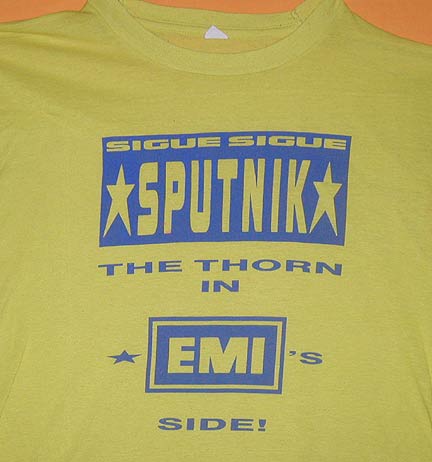
Afterword
Sigue Sigue Sputnik’s futurism looks old now, not just because it’s out of date but because futurism itself seems quaint.
Does anyone still sing about the future in utopian terms to escape from the harsh realities of the present? Maybe people realise that, whilst things are bad now, the future is going to be much worse.
Space travel has become mundane, computers have merely heralded new ways of shopping, new forms of alienation. And even shopping is less possible now.
Business, boardrooms and commerce look less sexy in 2012. Not because of the triumph of art or anti-capitalism, but because of the failures of business. Perhaps the re-emergence of the boardroom fetish will be the first signs of the recovery…












